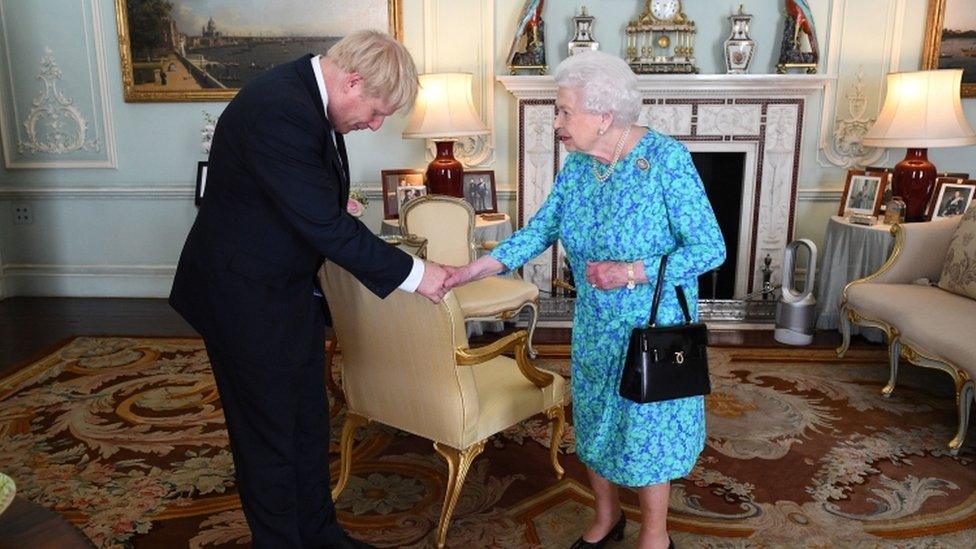A solemn start for Prime Minister Johnson
- Published
Boris Johnson's first speech as UK PM: "Never mind the backstop, the buck stops here"
With self-effacing drollery, Malcolm Rifkind is wont to recount his own experience of losing office: climbing portentously into the back seat of a car, only to find it goes nowhere.
Sans chauffeur, sans power, sans everything.
Theresa May wasn't instantly deprived of motorised transport today, at least in terms of taking her to the Palace - and then away again, shorn of office.
But there is nothing quite so ex as an ex-PM. And Boris Johnson only served to emphasise that in his own subsequent address outside Downing Street.
He praised his predecessor. But it was perfunctory, limited to acknowledging her "fortitude and patience" along with her devotion to public service.
The rest of his remarks depicted her premiership as, in essence, a failure with regard to the key task of Brexit.
One can readily understand why. The Johnson narrative is that he arrives with the energy and enthusiasm to get Brexit over the line after what he bluntly characterised as "three years of indecision".
No use smoothing the departure of Mrs May. No time, either. Mr Johnson contrived, successfully, to sound impatient for progress.

The Queen hosted Mr Johnson at Buckingham Palace shortly after she had accepted Theresa May's resignation
If his trademark is his mischievous grin, it was decidedly and deliberately absent today.
Solemnity itself in the still pic of the new PM with Her Majesty the Queen, accepting the challenge of office.
Serious again, yet upbeat, in insisting that he was ready to take personal responsibility for what happens next. Never mind the backstop, he said, the buck stopped with him.
In that context, he had to traduce Theresa May's record. He had to depict the foregoing as an unalloyed failure. After all, he resigned from her government.
He needed to reassert that characterisation in order to be able to project himself as different.
Mrs May will understand. And she can scarcely complain. After all, in her final set of exchanges as PM in the Commons, she invited Labour's Jeremy Corbyn to follow her in quitting high office.
There was, intriguingly, more of a charitable touch in her responses to Ian Blackford, the SNP Westminster leader. But then he had struck a notably emollient tone, stressing their continuing differences while recalling their consensual moments on issues of security.
Theresa May was cheered by MPs as she concluded her final PMQs
But back to the future. Back to the new PM. There was a range of policy in his Downing Street pronouncements although, perhaps inevitably, little in the way of detail.
He promised more police on the street, more for the NHS, more for education - and, above all, an effort to fix what he called a crisis in social care. Scotland would get Barnett consequentials from that spending package.
On society, he stressed the rights of women and the LGBT community.
On the economy, he talked of building on strengths in satellite technology, bioscience and other areas.
On tax, he talked of encouraging investment in capital and research as part of an autumn package. There was, interestingly, no precise mention at this stage of his campaign pledge to cut income taxation for higher earners which caused controversy.
'Awesome foursome'
And Brexit? Out by October 31, no ifs or buts. Out, he very much hoped and anticipated, with a deal. But out, otherwise, without agreement.
Again, the absence of detail here is understandable. As I have said to the point of ennui (yours not mine), this is not solely a decision for the UK PM nor the House of Commons.
It is a bargain to be struck with an increasingly frustrated European Union. A negotiation in which, again, Mr Johnson relies upon eagerness and energy. Which may, or may not, be sufficient.
And Scotland? Here, we heard the anticipated words stressing the centrality of the Union, albeit set in a wider context of "unleashing the productive power" of every corner of these islands.
Caledonia, it seems, is now one of the "awesome foursome". I would say it sounded like a bunch of superheroes - if Kenny Farquharson hadn't beaten me to it in The Times.
More, no doubt, on that when the new PM turns his attention directly to Scotland in the coming days.
For now, he set off to "change the record". It will, as he recognised, lie with the British people to determine whether the new tune comes over as harmonious or discordant.
- Published24 July 2019

